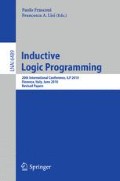Abstract
Existing ILP (Inductive Logic Programming) systems are implemented in different languages namely C, Progol, etc. Also, each system has its customized format for the input data. This makes it very tedious and time consuming on the part of a user to utilize such a system for experimental purposes as it demands a thorough understanding of that system and its input specification. In the spirit of Weka [1], we present a relational learning workbench called BET(Background + Examples = Theories), implemented in Java. The objective of BET is to shorten the learning curve of users (including novices) and to facilitate speedy development of new relational learning systems as well as quick integration of existing ILP systems. The standardized input format makes it easier to experiment with different relational learning algorithms on a common dataset.
Access this chapter
Tax calculation will be finalised at checkout
Purchases are for personal use only
Preview
Unable to display preview. Download preview PDF.
References
Frank, E., Hall, M.A., Holmes, G., Kirkby, R., Pfahringer, B., Witten, I.H.: Weka- A machine learning workbench for data mining. In: Data Mining and Knowledge Discovery Handbook- A Complete Guide for Practitioners and Researchers, pp. 1305–1314. Springer, Berlin (2005)
Blockeel, H., De Raedt, L.: Top-down induction of first-order logical decision trees. Artificial Intelligence Journal, 285–297 (1998)
Muggleton, S.H., Feng, C.: Efficient induction of logic programs. In: Proceedings of the First Conference on Algorithmic Learning Theory, Ohmsha, Tokyo, pp. 368–381 (1990)
Ross Quinlan, J., Mike Cameron-Jones, R.: FOIL: A Midterm Report. In: Brazdil, P.B. (ed.) ECML 1993. LNCS, vol. 667, pp. 3–20. Springer, Heidelberg (1993)
Sato, T., Kameya, Y., Zhou, N.-F.: Generative Modeling with Failure in PRISM. In: IJCAI, pp. 847–852 (2005)
Sato, T., Kameya, Y.: PRISM: A Language for Symbolic-Statistical Modeling. In: IJCAI, pp. 1330–1339 (1997)
Kavurucu, Y., Senkul, P., Toroslu, I.H.: ILP-based concept discovery in multi-relational data mining. Expert Systems with Applications 36, 11418–11428 (2009)
Aleph Manual, http://www.comlab.ox.ac.uk/activities/machinelearning/Aleph/aleph.html
Statistical Relational Learning Notes, http://www.cse.iitb.ac.in/~cs717/notes/
TILDE: Top-down Induction of Logical Decision Trees, http://www-ai.ijs.si/~ilpnet2/systems/tilde.html
YAP Manual, http://www.dcc.fc.up.pt/~vsc/Yap/
SWI-Prolog, http://www.swi-prolog.org/
General Inductive Logic Programming System, http://www.doc.ic.ac.uk/~jcs06/GILPS/
ILP Systems Integrated Implemented in BET and Sample Examples, http://www.cse.iitb.ac.in/~bet/appendix.pdf
Author information
Authors and Affiliations
Editor information
Editors and Affiliations
Rights and permissions
Copyright information
© 2011 Springer-Verlag Berlin Heidelberg
About this paper
Cite this paper
Kalgi, S. et al. (2011). BET : An Inductive Logic Programming Workbench. In: Frasconi, P., Lisi, F.A. (eds) Inductive Logic Programming. ILP 2010. Lecture Notes in Computer Science(), vol 6489. Springer, Berlin, Heidelberg. https://doi.org/10.1007/978-3-642-21295-6_16
Download citation
DOI: https://doi.org/10.1007/978-3-642-21295-6_16
Publisher Name: Springer, Berlin, Heidelberg
Print ISBN: 978-3-642-21294-9
Online ISBN: 978-3-642-21295-6
eBook Packages: Computer ScienceComputer Science (R0)

